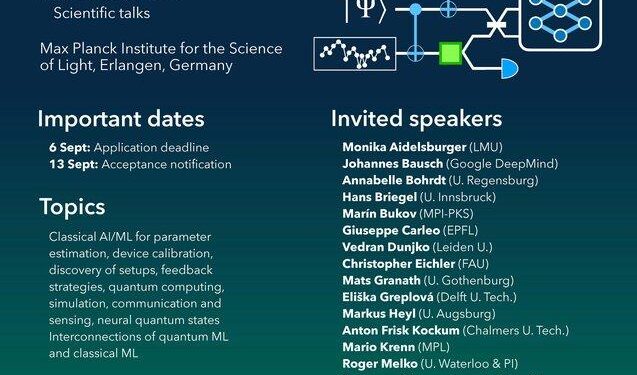The University of Tennessee at Chattanooga (UTC) is set to become a hub of quantum innovation this June as it hosts a three-day workshop dedicated to the rapidly evolving field of quantum technology. From June 23 to 25, experts, researchers, and enthusiasts will gather to explore breakthroughs, applications, and future prospects of quantum science. This event, highlighted by Chattanoogan.com’s breaking news coverage, promises to spark insightful discussions and foster collaboration in a domain poised to revolutionize computing, communication, and beyond.
UTC Prepares Industry Leaders for Emerging Quantum Technologies
Conversations around the future of technology are accelerating, and the upcoming UTC workshop is designed to place industry pioneers at the forefront of this revolution. Over three intensive days, participants will dive deep into the mechanics and applications of quantum computing, quantum encryption, and advanced quantum sensors. The event promises a dynamic blend of expert-led seminars, hands-on labs, and networking opportunities, offering accessibility to both newcomers and seasoned professionals aiming to harness quantum capabilities for business innovation.
Attendees will benefit from sessions focused on:
- Quantum hardware developments and scalability challenges
- Impacts of quantum technologies on cybersecurity
- Emerging markets influenced by quantum advancements
- Collaboration models between academia and industry
| Workshop Date | Key Focus | Target Audience |
|---|---|---|
| June 23, 2024 | Quantum Computing Fundamentals | Technologists & Researchers |
| June 24, 2024 | Quantum Security Applications | Security Experts & Policymakers |
| June 25, 2024 | Industry Integration Strategies | Business Leaders & Innovators |
Exploring Practical Applications and Challenges in Quantum Computing
Quantum computing promises to revolutionize fields ranging from cryptography to drug discovery by harnessing the bizarre properties of quantum mechanics. Among its most exciting practical applications are:
- Optimization Problems: Streamlining logistics and supply chain management with unprecedented efficiency.
- Material Science: Simulating complex molecules to accelerate the creation of new materials and medications.
- Cryptography: Enhancing cybersecurity through quantum-resistant encryption and accelerating code-breaking techniques.
Despite these breakthroughs, several challenges temper immediate implementation. Quantum hardware remains fragile, requiring environments with extreme stability and low temperatures. Additionally, error correction and qubit coherence continue to be major hurdles that researchers must overcome before widespread practical adoption is possible.
| Challenge | Description | Current Status |
|---|---|---|
| Qubit Stability | Maintaining qubit coherence over time | Moderate progress |
| Error Correction | Detecting and correcting quantum errors | In development |
| Scalability | Adding more qubits without performance loss | Early stages |
Strategies for Integrating Quantum Innovations into Business and Research
Bridging the gap between quantum theory and practical application requires a well-structured approach tailored to the unique demands of both businesses and research institutions. Early collaboration between quantum physicists, software developers, and industry experts is crucial to identifying relevant use cases, whether optimizing complex supply chains or enhancing cryptographic systems. Companies should prioritize pilot projects that focus on hybrid quantum-classical algorithms, allowing a smooth transition from existing technologies. Additionally, fostering an environment of continuous learning ensures teams stay updated with rapidly evolving quantum tools and methodologies.
To effectively integrate quantum innovations, organizations must embrace flexible infrastructure and scalable resources. This can be achieved by investing in cloud-based quantum computing platforms, which offer experimental access without significant upfront hardware costs. Below is a simple framework outlining the fundamental steps for successful integration:
| Step | Action | Benefit |
|---|---|---|
| 1 | Identify quantum-relevant problems | Targeted innovation efforts |
| 2 | Develop interdisciplinary teams | Faster iteration and discovery |
| 3 | Utilize hybrid computing models | Optimized performance |
| 4 | Leverage cloud quantum platforms | Cost-effective experimentation |
| 5 | Implement feedback loops | Continuous improvement |
By following these strategic actions, businesses and research organizations can capitalize on quantum technology’s disruptive potential while mitigating risks associated with premature adoption. Staying adaptable and fostering partnerships across academic and industrial domains will ultimately drive sustainable breakthroughs and competitive advantages.
Wrapping Up
As UTC prepares to open its doors to experts, innovators, and enthusiasts this June, the upcoming Quantum Technology Workshop promises to be a pivotal gathering at the forefront of scientific progress. Over three days, attendees will have the opportunity to delve into the mysteries and possibilities of quantum advancements, fostering collaborations that could shape the future of technology. Whether you’re a seasoned researcher or simply curious about the quantum realm, this event at UTC is set to illuminate new pathways in a rapidly evolving field-mark your calendars and stay tuned for the breakthroughs that are sure to emerge.










